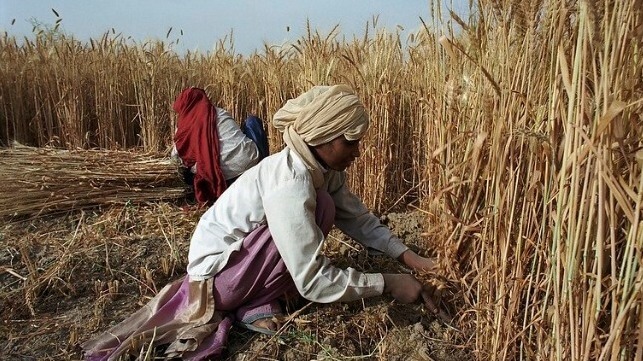In an Undersupplied Global Grain Market, India Bans Wheat Exports

As prices soar in the international grain trade, India has issued a sudden ban on wheat exports in order to support stable domestic prices and supply levels.
A brutal heat wave is expected to take a toll on India's grain production this year, cutting into the Indian government's hopes to increase exports amidst a tight global market. India holds about 10 percent of the world's stored grain reserves, and these tonnes are badly needed in the global market due to the loss of export volume from Ukraine. The Russian invasion has shuttered all Ukrainian seaports, leaving one of the world's leading wheat exporters without a viable route to market for its crops. Between them, Russia and Ukraine supply about 30 percent of the world's wheat and barley, according to the World Food Programme (WFP)
The Indian government signaled last month that it would open its granaries and sell wheat to the world, viewing it as an opportunity for farmers to capitalize on high international prices. However, the crushing heat wave that has hit the Indian subcontinent has raised fears of a bad harvest in 2022. Harish Damodaraan, a senior fellow at the Centre for Policy Research in Delhi, told CNBC that yields are expected to fall by 15-20 percent in the most affected regions.
In response, India's Commerce Department announced Friday that it would ban all wheat exports that do not already have a letter of credit secured. It will allow limited exceptions for exports to nations with vulnerable food supplies.
According to Reuters, the sudden ban is creating significant challenges for India's commodity traders, who may have to declare force majeure on planned shipments that do not already have a letter of credit attached. It is a stunning turnaround, since official government policy had encouraged farmers to export their crop right up until the day of the ban. Now, export-bound stocks that are trapped in storage will have to be resold on India's domestic market, and likely at a lower price - helping to ensure an adequate food supply at a reduced rate of inflation for Indian consumers.
While it may benefit the Indian public in the near term, the decision threatens to further increase the price of wheat for developing nations like Syria and Yemen, which have already been hit hard by the shutdown of Ukraine's grain terminals. Global wheat prices rose 20 percent in March, contributing to inflationary pressures that are forcing the World Food Programme to buy less and cut aid rations in war-torn and famine-stricken regions.
"The latest data from the International Food Policy Research Institute’s food trade policy tracker show that, since the Ukraine invasion, 23 countries have imposed export restrictions on food," noted WFP chief economist Dr. Arif Husain in a bulletin issued Monday. "It is critical that WTO facilitates coordination between governments and encourages major countries holding reserves, such as China, India and the United States, to release grain stocks onto international markets."
Top image: Wheat harvest in central India (Scott Wallace / World Bank / CC BY-NC-ND 2.0)
